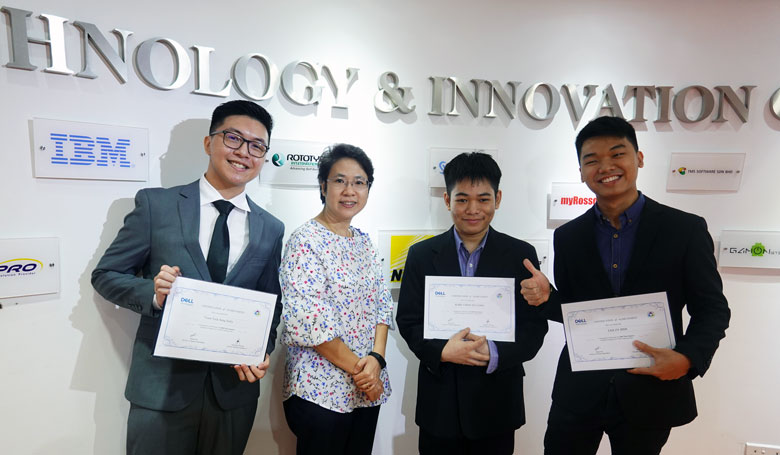IT Programmes to help realise Malaysia’s Digital Economy Blueprint
June 17, 2021 | Campus News
The School of Information and Communication Technology of HELP University prides itself on offering innovative programmes that produce smart and innovative graduates to serve the needs of business and industry and society in general.
This role assumes a special significance and urgency in light of the launch of the Malaysia Digital Economy Blueprint last month with the stated vision of transforming Malaysia into a regional leader in digital economy with a RM70B investment in digitalisation by 2025 and the digital economy expected to eventually contributing 22.6 per cent of the nation’s GDP.
The Faculty of Computing and Digital Technology currently focuses on training students in Data Analytics, Internet of Things (IOT) and software development. It offers four programmes: the Diploma in IT, Bachelor of Information Technology, Bachelor of Information Technology (Data Analytics) and the Master of Data Science.
Commenting on the value of these programmes, the head of the School of Information and Communication Technology, Dr Tang U-Liang, said: “Data scientists are highly sought-after by organizations which need skilled individuals who can use advanced analytics, artificial intelligence and machine learning to create a sustainable value chain from enterprise data to decision making in the boardroom. The ultimate aim is to contribute to raising efficiency and productivity in the service of the digital economy".
Dr Tang, a PhD from the National University of Singapore, is a data scientist with wide experience of applied research using AI and ML tools.
Elaborating on the rapidly evolving IT environment, Dr Tang said: “Unlike previous industrial revolutions, the Fourth Industrial Revolution is evolving at an exponential rather than a linear pace. With advances in artificial intelligence, robotics and the Internet of Things, biotechnology, energy storage and quantum computing, we have to ensure our graduates are equipped with the requisite skills and also the intellectual and mental agility to excel in the workplace”.
The School maintains intimate links with the IT industry: it has an Industry Advisory Board (IAB) whose members are leaders of professional and industry bodies like Pikom (Persatuan Industri Komputer dan Multimedia – The National Tech Association of Malaysia), Mobius, SAS and IBM.
The IAB provides advice on curriculum standards and relevancy to ensure that the graduates’ learning fulfils industrial needs and expectations and continues to keep up with rapid developments and global trends.
One of its members has stated that it is within the realm of reality to “expect that students of HELP will be inspired one day to build the Apples, Googles and Facebooks of the future in Malaysia”.
As an illustration of the students’ capability, Dr Tang cited the achievement of four final year students who recently signed up for the nation-wide Hack-to-Hire competition organised by Dell, the American multinational computer technology company, and emerged first place winners among 20 teams from universities and colleges across the country. Their prize is internships and job placements by Dell.
The School has a strong focus on Data Analytics.
The BIT (Hons) in Data Analytics includes topics like big data technologies, machine learning and data visualisation. It aims to produce graduates who are able to conceive and manage solutions in increasingly data-driven environments.
Students of the faculty also get value-added benefits to enrich their study experience at HELP.
In collaboration with SAS, the leading analytics software developer, students are offered a joint certificate of competency in the application of SAS tools for descriptive and predictive analytics.
They are also given practice in live stock-trading using Bloomberg business resources and facilities in HELP’s RM25 million Business Analytics and Technology Innovation Centre (BATIC).
A Data and Business Analytics certificate course is offered free to all students; while HELP’s extensive network of local and international collaborators provides them mentorship in data analytics and e-entrepreneurship, the latest being from the Alibaba Business School.
The faculty’s efforts have received recognition and endorsement from the industry and governing bodies. Its programmes contribute to transforming HELP into an Analytics-Driven Entrepreneurial University, for which MDEC (Malaysian Digital Economy Corporation) named HELP as a Premier Digital Tech Institution (PDTI), one of a handful of institutions to receive this honour.
External recognition for the faculty comes in the form of acceptance by China’s leading Beijing Jiaotong University (BJTU) for students to transfer credits to BJTU for a degree in software engineering, with industrial exposure opportunities in the Haidian technology hub in Beijing where BJTU is located.
Two Go8 (Group of Eight) Australian universities - the University of Queensland and the Australian National University - also accept transfer of credits from HELP for Information Technology, Computer Science and Software Engineering programmes. The Go8 comprises Australia’s leading research intensive universities and are consistently the highest ranked of all Australian universities.
View Other categories: NATIONAL | CAMPUS | ACHIEVEMENT | EDITOR'S DESK

























